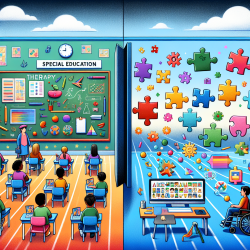Introduction
In the realm of speech-language pathology, understanding the genetic underpinnings of neurodevelopmental disorders is crucial for devising effective therapeutic interventions. One such disorder, Phelan McDermid Syndrome (PMS), presents a complex genetic landscape that challenges practitioners to stay informed and adaptive. Recent research, particularly the study titled "Identification of 22q13 genes most likely to contribute to Phelan McDermid syndrome," offers valuable insights that can guide practitioners in enhancing their skills and outcomes for children affected by PMS.
Understanding Phelan McDermid Syndrome
Phelan McDermid Syndrome is a rare genetic disorder caused by deletions or mutations on chromosome 22q13.3, often involving the SHANK3 gene. This syndrome is characterized by intellectual disability, speech delays, autism spectrum symptoms, and motor impairments. The variability in phenotypic expression makes it imperative for practitioners to understand the genetic nuances that contribute to these manifestations.
Key Findings from the Research
The research article identifies several genes on the 22q13 region that are likely contributors to PMS. These genes are categorized based on their functions, such as:
- Molecular signaling at glutamate synapses
- Neuropsychiatric disorder phenotypes
- Multicellular organization
- Cerebellar development and functioning
- Mitochondrial functions
Understanding these categories helps in recognizing the potential impact of each gene on the overall phenotype of PMS, providing a roadmap for targeted therapeutic interventions.
Implications for Practitioners
For speech-language pathologists, the implications of this research are profound. By integrating genetic insights into therapeutic practices, practitioners can tailor interventions to address specific deficits associated with PMS. For instance, targeting cerebellar functioning can aid in improving motor skills, while understanding molecular signaling pathways can enhance communication strategies.
Encouraging Further Research
While this study provides a foundation, it also highlights the need for further research. Practitioners are encouraged to engage with ongoing studies and contribute to the growing body of knowledge on PMS. Collaborative efforts can lead to the development of innovative therapies and improved outcomes for children with PMS.
Conclusion
By leveraging the findings from the study on 22q13 genes, practitioners can enhance their understanding and approach to treating Phelan McDermid Syndrome. This research not only informs clinical practice but also inspires further exploration into the genetic intricacies of neurodevelopmental disorders. Together, we can unlock the potential within each child, paving the way for brighter futures.
To read the original research paper, please follow this link: Identification of 22q13 genes most likely to contribute to Phelan McDermid syndrome.










